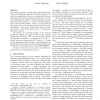Free Online Productivity Tools
i2Speak
i2Symbol
i2OCR
iTex2Img
iWeb2Print
iWeb2Shot
i2Type
iPdf2Split
iPdf2Merge
i2Bopomofo
i2Arabic
i2Style
i2Image
i2PDF
iLatex2Rtf
Sci2ools
121
click to vote
CORR
2008
Springer
2008
Springer
Improved Smoothed Analysis of the k-Means Method
The k-means method is a widely used clustering algorithm. One of its distinguished features is its speed in practice. Its worst-case running-time, however, is exponential, leaving a gap between practical and theoretical performance. Arthur and Vassilvitskii [3] aimed at closing this gap, and they proved a bound of poly(nk , -1 ) on the smoothed runningtime of the k-means method, where n is the number of data points and is the standard deviation of the Gaussian perturbation. This bound, though better than the worstcase bound, is still much larger than the running-time observed in practice. We improve the smoothed analysis of the k-means method by showing two upper bounds on the expected running-time of k-means. First, we prove that the expected running-time is bounded by a polynomial in n k and -1 . Second, we prove an upper bound of kkd
CORR 2008 | Education | K-means | K-means Method | Upper Bound |
Related Content
| Added | 09 Dec 2010 |
| Updated | 09 Dec 2010 |
| Type | Journal |
| Year | 2008 |
| Where | CORR |
| Authors | Bodo Manthey, Heiko Röglin |
Comments (0)

